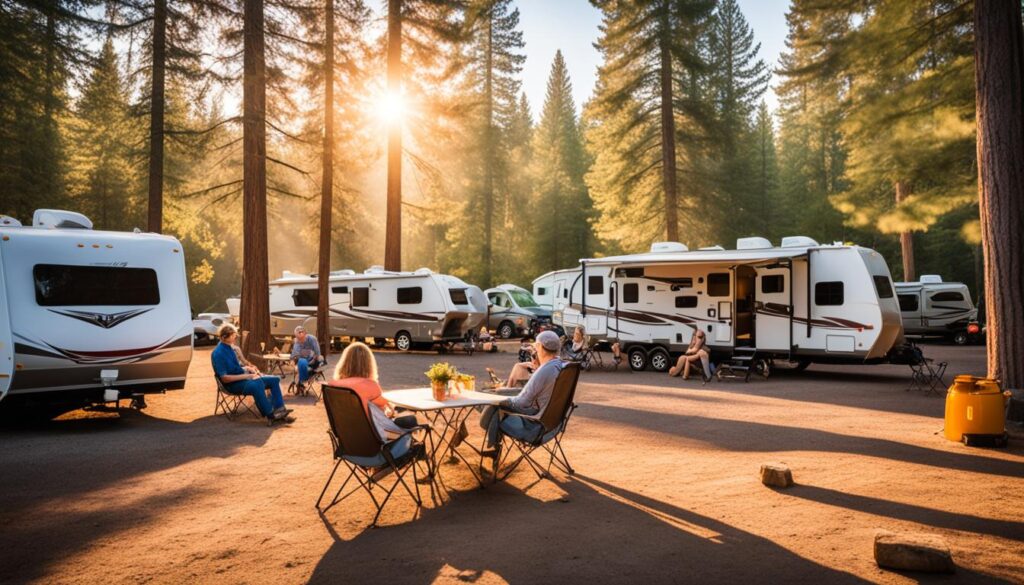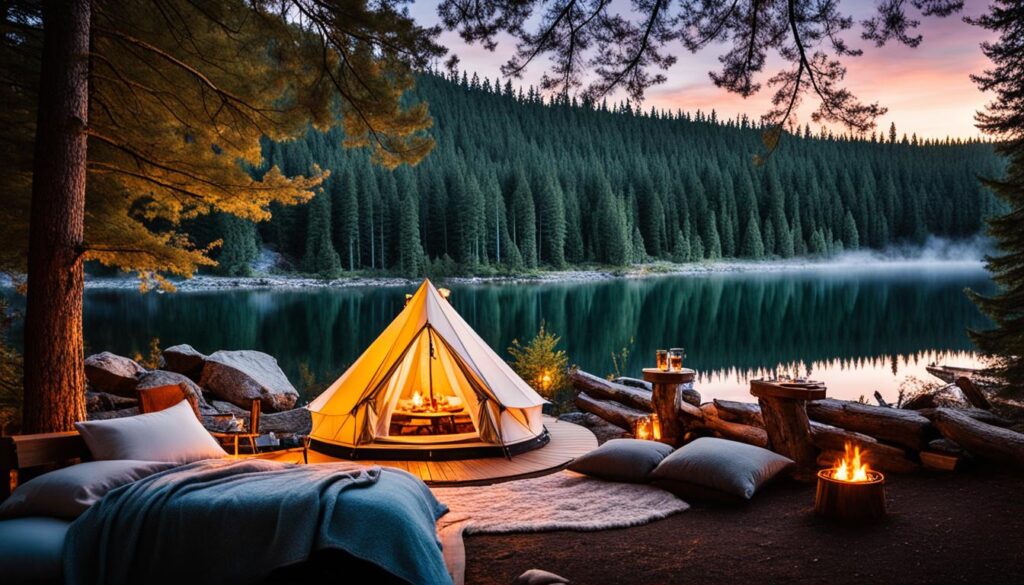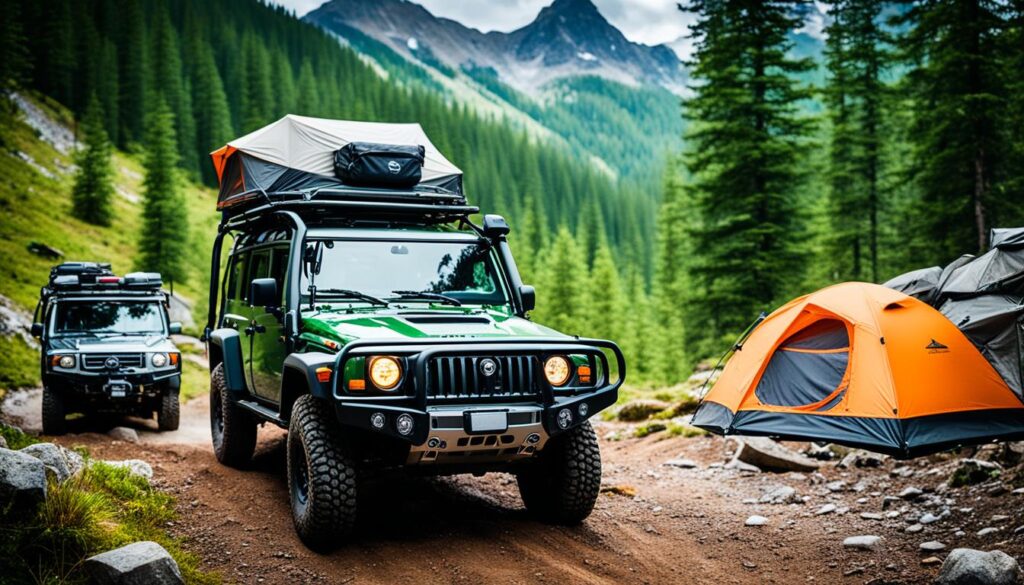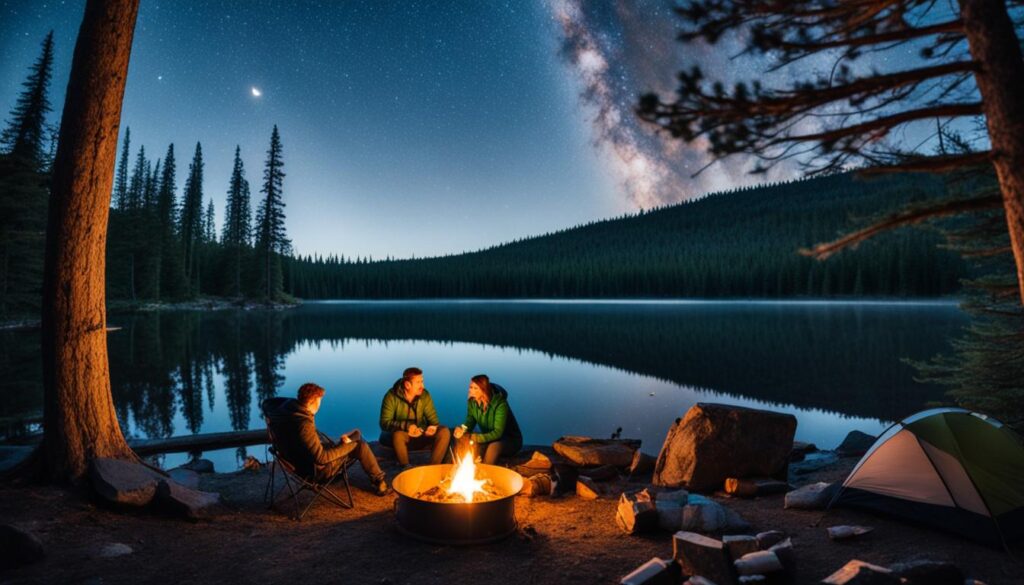RV living can be intimidating for beginners, especially when considering full-time living in an RV. However, with the right tips and guidance, it can become an exciting and rewarding adventure. In this comprehensive guide, I will cover everything you need to know about RVing for beginners, from budgeting to RV maintenance and more. Get ready to embark on your RV journey with confidence!
Key Takeaways:
- RVing for Beginners is a diverse and exciting lifestyle choice.
- Proper budgeting is crucial for a successful RV journey.
- Research different types of RVs to find one that suits your needs.
- Practice driving and maneuvering an RV to build confidence.
- Be considerate of fellow campers and follow campground etiquette.
Contents
- 1 Full Time RV Living For Beginners Tips
- 2 How to Shop For and Buy an RV
- 3 How to Drive (or Tow) an RV
- 4 What You Should Know Before Your First RV Trip
- 5 RV Basics on Campground Etiquette
- 6 RV Maintenance and Repairs
- 7 Buying an RV for the First Time?
- 8 Minimizing Clutter and Maximizing Space
- 9 Organizing Kitchen and Pantry
- 10 Conclusion
- 11 FAQ
- 12 Source Links
Full Time RV Living For Beginners Tips
When considering full-time RV living, it’s important to address key questions like the cost of living in an RV and whether it is cheaper than a house. While costs can vary depending on factors like travel style and location, there are universal expenses to consider:
- Purchasing an RV
- Park fees
- Utilities
- Maintenance
- Insurance
- Roadside assistance
- Fuel
- Activities
- RV memberships
- Groceries
- Eating out
- Internet data plans
- Laundry
- Entertainment subscriptions
- Propane
- Water
- Sewage
- Mail forwarding services
By budgeting for these expenses and knowing your travel style, you can determine the cost of living in an RV that suits your lifestyle.
Remember, full-time RV living offers unique benefits such as the freedom to travel and experience new places, but it also requires careful financial planning and consideration of ongoing expenses.
| Expenses | Average Monthly Cost |
|---|---|
| Park Fees | $400 |
| Utilities | $200 |
| Maintenance | $300 |
| Insurance | $150 |
| Roadside Assistance | $50 |
| Fuel | $400 |
| Activities | $200 |
| RV Memberships | $100 |
| Groceries | $300 |
| Eating Out | $200 |
| Internet Data Plans | $100 |
| Laundry | $50 |
| Entertainment Subscriptions | $100 |
| Propane | $50 |
| Water | $50 |
| Sewage | $50 |
| Mail Forwarding Services | $50 |
These values are approximate and can vary depending on individual circumstances and choices.
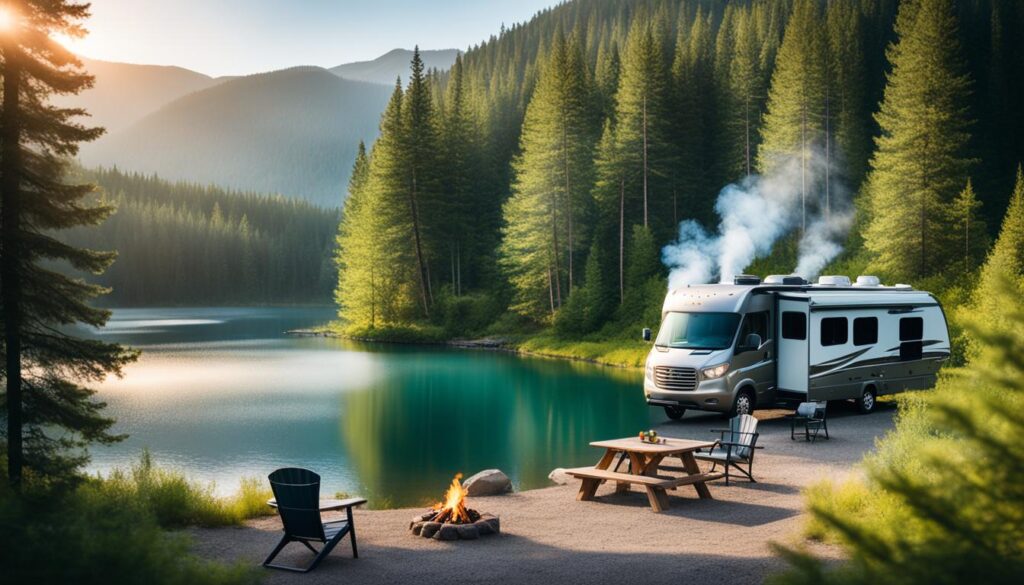
How to Shop For and Buy an RV
When it comes to buying an RV, thorough research and careful consideration are essential. Here are some tips to guide you through the process of shopping for and purchasing the perfect RV for your needs.
1. Research Different Types of RVs:
Before making a decision, familiarize yourself with the different types of RVs available. From motorized Class A, B, and C motorhomes to towable travel trailers and fifth wheels, each offers unique features and advantages. Determine which type best suits your lifestyle and needs.
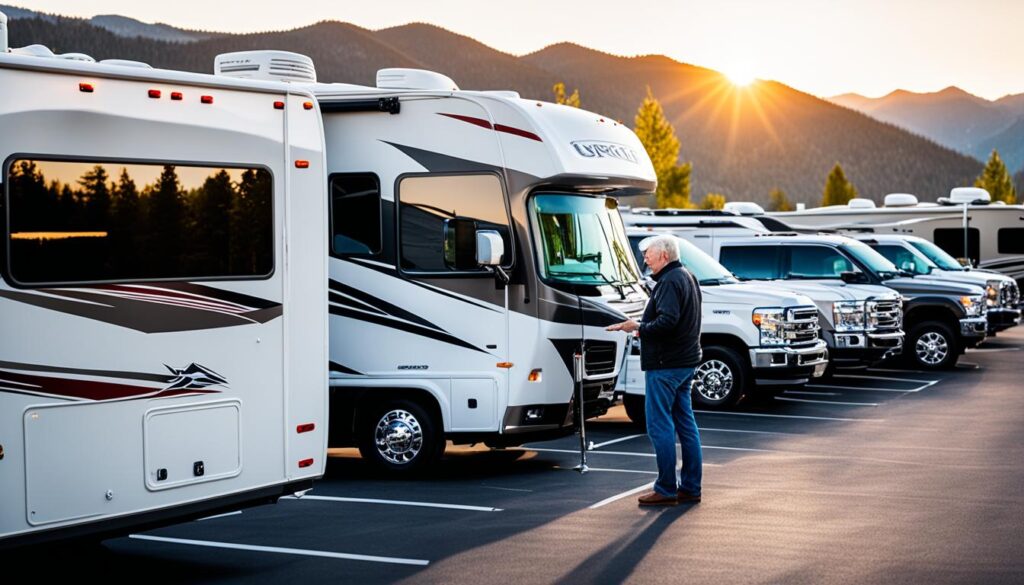
2. Consider Size and Features:
Decide on the size and features that will best accommodate your travel requirements. Think about the number of occupants, desired amenities, and storage space. Take into account factors like floorplan layout, leveling system, and whether you prefer a motorized or towable RV.
3. Rent an RV for Real-World Experience:
If you’re unsure about the type of RV that suits you best, consider renting one before making a purchase. This way, you can gain firsthand experience and a better understanding of your preferences and needs.
4. Visit a Dealership Prepared:
When ready to shop for an RV, visit a reputable dealership armed with your research and a list of must-haves. A dealership can provide valuable insights, answer your questions, and offer guidance throughout the buying process.
5. Consider Future Needs:
When selecting an RV, think about your future needs. Buying a slightly larger RV than you initially need can allow for additional living space and accommodate potential changes in your lifestyle or family size.
Remember, buying an RV is a significant investment. By taking the time to research and consider your options, you can choose an RV that provides comfort, convenience, and unforgettable adventures on the open road.
How to Drive (or Tow) an RV
Driving an RV can be intimidating for beginners, but with practice and a few tips, you can build confidence behind the wheel. Whether you’re driving a motorized RV or towing one, mastering maneuvering techniques is essential for a safe and enjoyable travel experience.
Firstly, find an empty parking lot or open space where you can practice driving and maneuvering your RV. This will allow you to become familiar with its size, weight, and handling characteristics. Take your time to get comfortable with turning, accelerating, and braking, paying attention to how the RV responds to your inputs.
When driving an RV, it’s important to remember that its size requires wider turns compared to a regular car. Make wide turns to accommodate for the size and swing of the RV, keeping a safe distance from curbs, signposts, and other obstacles. Practice turning left and right, and always use your side and rear-view mirrors to check for clearance.
Another crucial aspect of RV driving is being aware of the RV’s dimensions and height. Measure the height of your RV and be mindful of height restrictions, such as low bridges and overpasses. Plan your route beforehand to avoid any clearance issues, and always double-check for road signs and warnings.
Lastly, maintaining a safe speed and adjusting your driving style to accommodate the weight and size of the RV is key. Remember that RVs have a higher center of gravity compared to cars, which affects stability and maneuverability. Drive at a speed that is comfortable for you, allowing extra time and space for braking and lane changes.
By taking the time to practice and adjust your driving style, you can gain confidence and enjoy the freedom of RV travel. Remember to always prioritize safety, be patient with yourself, and don’t hesitate to seek professional driving lessons if needed.
So, whether you’re embarking on a cross-country RV adventure or towing your RV to a nearby campground, these tips will help you navigate the road with ease.

| RV Driving Tips | Towing an RV | Rv Maneuvering |
|---|---|---|
| Practice driving in an empty space to build confidence. | Ensure your tow vehicle is properly rated and equipped. | Make wide turns to accommodate for the size of the RV. |
| Familiarize yourself with the RV’s dimensions and height. | Consider using sway control devices when towing. | Be aware of clearance issues and height restrictions. |
| Use your side and rear-view mirrors to check for clearance. | Practice braking and accelerating with the additional weight. | Adjust your driving style to accommodate the RV’s size and weight. |
| Plan your route to avoid low bridges and overpasses. | Keep a safe distance from other vehicles on the road. | Drive at a safe, comfortable speed for the RV. |
What You Should Know Before Your First RV Trip
Embarking on your first RV trip can be an exciting adventure filled with new experiences and memorable moments. However, it’s essential to be prepared and knowledgeable before hitting the road. Here are some valuable tips to ensure a smooth and enjoyable journey:
Practice Driving and Familiarize Yourself with Your RV
Before setting off on your first RV trip, take the time to practice driving your RV in different road conditions. Familiarize yourself with its features, such as the dashboard controls, mirrors, and braking system. This will help build your confidence and make you feel more comfortable behind the wheel during your travels.
Arrive at Your Campsite Before Nightfall
Plan your journey so that you arrive at your campsite before nightfall. This will give you ample time to settle in and set up camp while still having daylight. It’s important to take your time and ensure everything is properly connected and secured in your campsite, including leveling your RV, hooking up utilities, and arranging your outdoor living area.
Create an RV Trip Checklist
Having a comprehensive RV trip checklist is essential to ensure you don’t forget any important equipment or supplies. Consider items such as leveling blocks, wheel chocks, water hoses, electrical adapters, camping chairs, cooking utensils, and bedding. Check off each item on the list as you pack, ensuring that nothing is left behind.
Download RV Apps
Make the most of technology by downloading RV-specific apps. Navigation apps designed for RVs can provide valuable information about low bridges, narrow roads, and RV-friendly routes. Campground finder apps can help you locate campgrounds with the amenities and facilities you desire. These apps can enhance your RV travel experience, making it easier to find suitable campsites and plan your route.
Practice Campground Etiquette
Being a respectful and courteous camper is essential when staying at campgrounds. Be mindful of your noise levels during quiet hours, respecting the peace and privacy of other campers. Dispose of waste properly, using designated dump stations for sewage and trash receptacles for garbage. Follow campground rules and regulations, ensuring a harmonious environment for everyone.
Remember, your first RV trip is an opportunity to immerse yourself in the RV lifestyle and create lasting memories. By following these tips and being prepared, you can set off on your adventure with confidence, ready to embrace the freedom and beauty of RV travel.
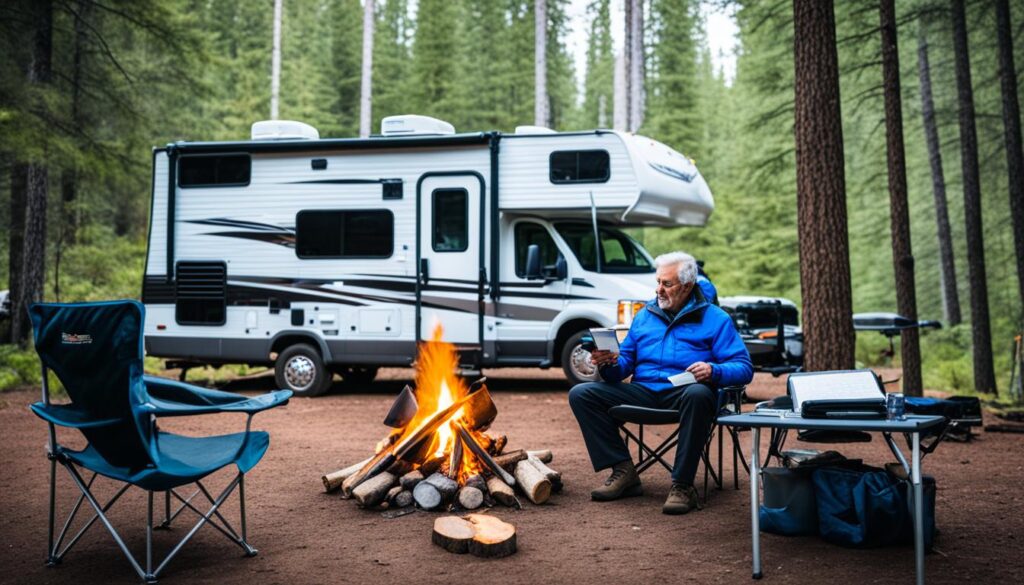
RV Basics on Campground Etiquette
When staying at a campground, it is important to be considerate to your fellow RV campers. Simple acts of kindness, like smiling and waving, can go a long way in fostering a friendly atmosphere.
During quiet hours, keep noise levels to a minimum to avoid disturbing other campers. Embracing peace and tranquility allows everyone to enjoy their camping experience to the fullest.
Proper waste disposal is another crucial aspect of campground etiquette. Be sure to use the designated dump stations for sewage and trash receptacles for garbage. This helps maintain a clean and enjoyable environment for everyone.
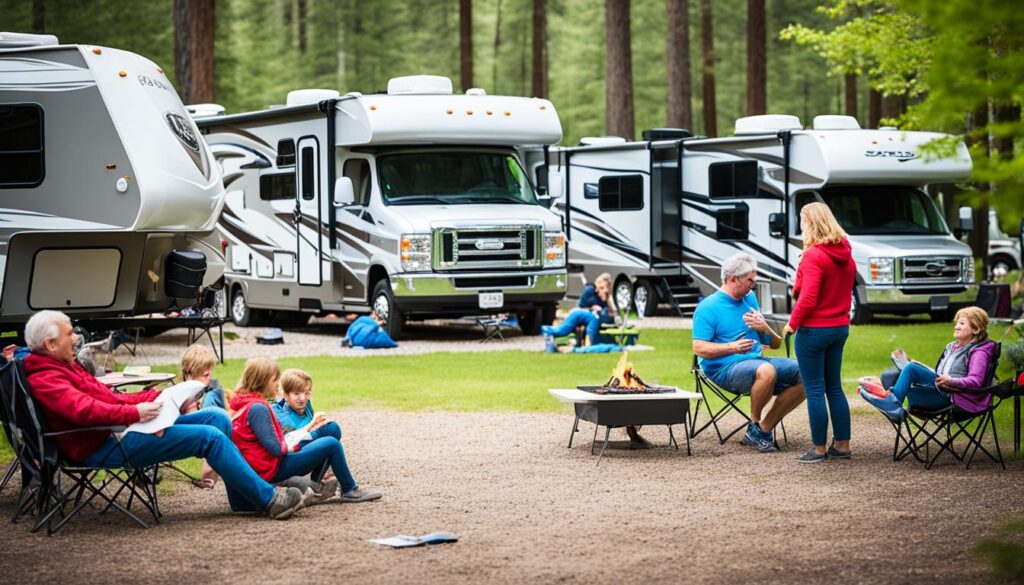
Remember, being a good campground neighbor involves respect, courtesy, and following the rules of the campground. By practicing campground etiquette, you contribute to a positive and harmonious camping community.
RV Maintenance and Repairs
Keeping your RV in good condition is essential for a smooth and enjoyable travel experience. Regular maintenance and timely repairs can help prevent costly issues down the road. Here are some key tips to keep your RV in top shape:
- Check and maintain seals: Regularly inspect and maintain seals on rooftop vents, windows, and doors to prevent leaks and water damage.
- Maintain tire pressure: Checking and maintaining proper tire pressure is crucial for safe travels. Invest in a tire pressure management system for real-time monitoring of tire status.
- Inspect propane tanks and awnings: Routinely inspect and maintain propane tanks, awnings, and other components of your RV to ensure they are functioning properly.
- Use a pre-departure and post-trip checklist: Having a checklist helps ensure that you don’t overlook any vital maintenance tasks before hitting the road or after returning from a trip.
By following these RV maintenance tips, you can avoid unexpected breakdowns and prolong the life of your RV. Remember, regular care and attention will keep you cruising smoothly on your RV adventures.
Importance of Regular Maintenance
Regular maintenance is crucial for the longevity and performance of your RV. By addressing issues promptly and performing routine checks, you can minimize the risk of major repairs and ensure your RV is always ready for the road ahead.
“Regular maintenance is like preventive medicine for your RV. It helps identify potential problems early on, saving you from costly repairs and unexpected breakdowns. Don’t overlook the importance of routine checks and care to keep your RV running smoothly.”
– RV enthusiast and maintenance expert
Whether you’re a seasoned RVer or just starting your RV journey, prioritizing maintenance and repairs will enhance your overall travel experience. Take the time to care for your RV, and you’ll be rewarded with worry-free adventures on the open road.
Buying an RV for the First Time?
As a first-time RV buyer, it’s important to approach the purchasing decision with careful consideration and research. With so many options available, it can be overwhelming to choose the right RV for your needs. To help you make an informed decision, here are some tips to guide you:
- Research different RV models: Take the time to explore the various types of RVs available, such as motorhomes, travel trailers, and fifth wheels. Consider factors like size, layout, and amenities to find the perfect fit for your lifestyle.
- Understand your specific needs: Determine how you plan to use your RV. Will you be traveling full-time or taking occasional trips? Knowing your usage plan will help you choose an RV that aligns with your requirements.
- Consider future needs: It’s wise to buy a slightly larger RV than you think you need. This allows for more living space and can accommodate any potential changes in your lifestyle or travel plans in the future.
- Rent an RV before purchasing: If you’re unsure about which RV is right for you, consider renting one first. This will give you valuable insights into your preferences and needs, helping you make a more informed purchasing decision.
Choosing the Right RV Type
When it comes to choosing the right RV type, it’s essential to consider your specific needs and preferences. Here’s a brief overview of the different RV types:
| RV Type | Description |
|---|---|
| Motorhomes | Motorhomes are self-contained RVs that include a living space and a vehicle in one unit. They are available in various sizes and offer the convenience of having everything in a single package. |
| Travel Trailers | Travel trailers are non-motorized units that require a towing vehicle. They come in a range of sizes and offer flexibility for those who prefer to have a separate vehicle for day-to-day use. |
| Fifth Wheels | Fifth wheels are larger travel trailers that require a special hitch installed in the bed of a pickup truck. They often provide more interior space and are popular among full-time RVers. |
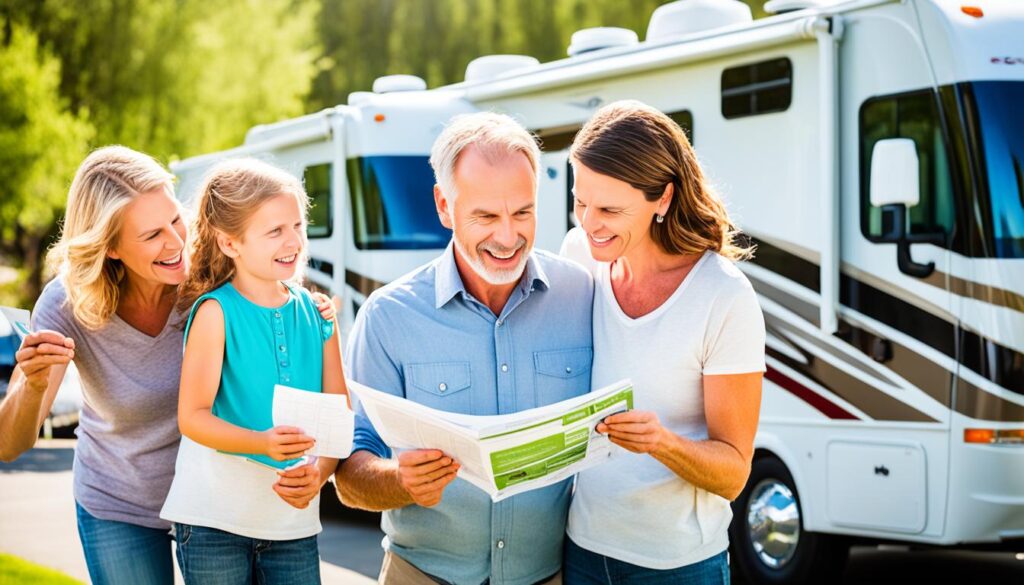
By taking the time to research different RV models, understand your needs, consider future requirements, and potentially rent an RV before making a purchase, you can make an informed decision that suits your RV lifestyle. Ensure that the RV you choose provides the comfort, amenities, and functionality you desire, allowing you to enjoy the freedom and adventure of the open road.
Minimizing Clutter and Maximizing Space
Creating a functional living area in an RV requires effective space optimization and minimizing clutter. By implementing strategic storage solutions and utilizing the available vertical space, you can maximize the limited area and create a more comfortable living environment.
One of the first steps in RV organization is to invest in storage solutions such as bins, baskets, and hanging organizers. These allow you to keep items organized and easily accessible. By assigning designated spaces for different items, you can prevent clutter from accumulating and make it easier to find what you need.
Utilizing vertical space is another key aspect of RV organization. Installing shelves and hooks on the walls can help you store items up high and free up floor space. This is especially useful for lightweight items that are commonly used, such as hats, coats, and kitchen utensils.
When it comes to furniture, opting for multi-purpose pieces can significantly maximize space in your RV. Look for items that serve multiple functions, such as a sofa bed or a table with built-in storage. Collapsible furniture, like foldable chairs and tables, can also be stored away when not in use, freeing up valuable space.
Regular decluttering is crucial for maintaining a tidy and spacious RV. Take the time to assess your belongings regularly and get rid of items that you no longer need or use. This not only helps to reduce clutter but also lightens the overall weight of your RV, making it easier to tow or drive.
Remember, a clutter-free RV not only enhances your living space but also contributes to a more enjoyable and stress-free travel experience. Prioritize organization and space optimization to create a comfortable home on wheels.
RV Organization Tips:
- Invest in storage solutions like bins, baskets, and hanging organizers
- Utilize vertical space by installing shelves and hooks
- Opt for multi-purpose furniture and collapsible items
- Regularly declutter and get rid of items you no longer need
Example of RV Storage Solutions:
| Storage Solution | Description | Image |
|---|---|---|
| Under-Bed Storage Bins | Affordable and space-efficient storage bins that can slide under the bed | 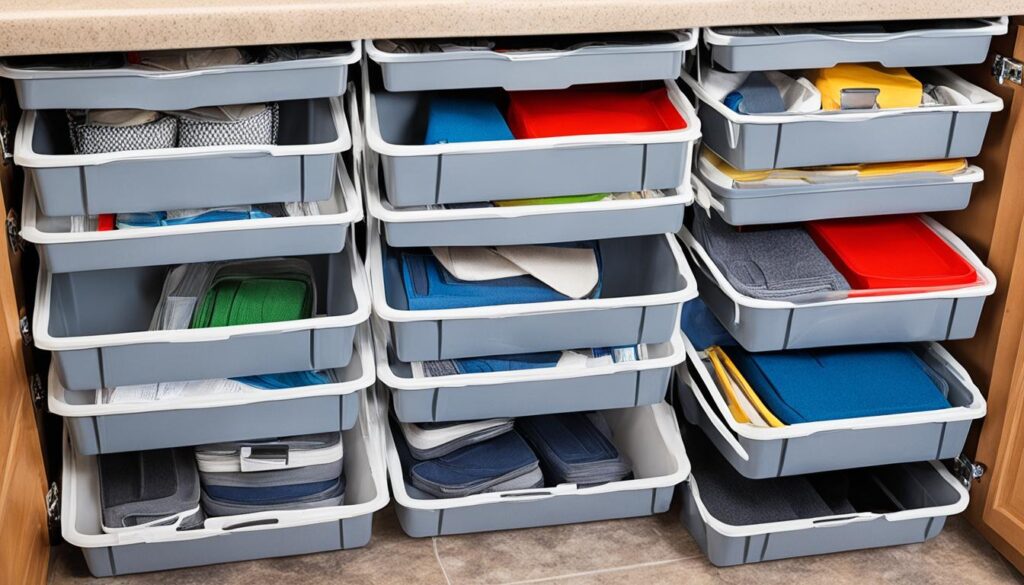 |
| Hanging Closet Organizer | A convenient and compact storage solution for clothes, shoes, and accessories | |
| Collapsible Kitchenware | Space-saving cookware and utensils that can be folded or collapsed for easy storage |
Organizing Kitchen and Pantry
In an RV, organizing the kitchen and pantry is essential to make the most of limited space. By implementing smart storage solutions, you can keep everything neat and easily accessible. Here are some tips for efficient RV kitchen organization and pantry storage:
1. Utilize Stackable Containers and Adjustable Shelves
Stackable containers and adjustable shelves are your best friends when it comes to maximizing cabinet and pantry space. These storage solutions allow you to utilize vertical space effectively and keep items organized.
2. Keep Frequently Used Items Within Easy Reach
Arrange your kitchen essentials in a way that keeps frequently used items within easy reach. This will save you time and effort when preparing meals on the road.
3. Use Drawer Dividers for Utensils and Small Kitchen Tools
Drawer dividers are ideal for separating utensils and small kitchen tools, preventing them from getting mixed up and making it easier to find what you need. It also helps to keep the drawers organized and clutter-free.
4. Opt for Compact Appliances and Collapsible Kitchenware
In an RV, space is precious. Opt for compact appliances and collapsible kitchenware to save valuable storage space when they’re not in use. This way, you can enjoy all the conveniences of a functional kitchen without sacrificing space.
5. Consider Wall-Mounted or Magnetic Spice Racks
Spices are essential for flavorful meals, but they can take up valuable counter space. Consider using wall-mounted or magnetic spice racks to free up counter space and keep your spices organized and easily accessible.
6. Regularly Declutter and Restock Your Pantry
Regularly go through your pantry to declutter and get rid of items you no longer need. This will help keep your pantry organized and prevent expired or unused items from taking up unnecessary space. Restock your pantry with essential ingredients and supplies so you’re always prepared for meals on the road.
By implementing these RV kitchen organization and pantry storage tips, you can create an efficient and functional kitchen space in your RV. With everything in its place, meal preparation becomes a breeze, allowing you to fully enjoy your RV adventures.
| RV Kitchen Organization Tips | Pantry Storage in an RV |
|---|---|
| Utilize stackable containers and adjustable shelves | Regularly declutter and restock your pantry |
| Keep frequently used items within easy reach | Consider wall-mounted or magnetic spice racks |
| Use drawer dividers for utensils and small kitchen tools | |
| Opt for compact appliances and collapsible kitchenware |
Conclusion
Embarking on an RV journey as a beginner can be both exciting and challenging. By following essential tips and guidelines, you can make your RVing experience more enjoyable and fulfilling. Establishing a budget is crucial to effectively manage your expenses and make the most of your RV lifestyle. Researching different RV models and finding one that suits your needs will provide a comfortable and functional living space. Practicing driving and maneuvering your RV will boost your confidence on the road and ensure a safe travel experience. Additionally, regular maintenance and repairs are essential to keep your RV in good condition and prevent any unexpected issues during your trips.
Remember to be considerate of your fellow campers and follow campground etiquette. Being respectful of others’ space and keeping noise levels to a minimum will contribute to a positive community atmosphere. Proper waste disposal is crucial for maintaining a clean and enjoyable environment for everyone. By embracing the RV lifestyle with an open mind and a willingness to learn, you can create unforgettable memories and explore new destinations on your RV adventures.
Whether you choose to embrace full-time RV living or enjoy occasional trips, the RV lifestyle offers the freedom to travel at your own pace and discover the beauty of the great outdoors. With the right preparation and a passion for exploration, RVing can become your ultimate gateway to adventure. So, take the leap and begin your RV journey today!
FAQ
How much does it cost to live in an RV full time?
The cost of living in an RV full time can vary depending on factors like travel style and location. Universal costs to consider include purchasing an RV, park fees, utilities, maintenance, insurance, roadside assistance, fuel, activities, RV memberships, groceries, eating out, internet data plans, laundry, entertainment subscriptions, propane, water, sewage, and mail forwarding services.
What should I consider before buying an RV?
Before buying an RV, it’s important to research different types of RVs and determine the size and features that best suit your needs. Consider factors like floorplan layout, the type of leveling system, and whether you want a motorized or towable RV. Renting an RV beforehand can also provide valuable real-world experience.
How can I become more confident in driving an RV?
To become more confident in driving an RV, practice driving and maneuvering your RV in empty parking lots or open spaces. Make wider turns to accommodate for the size and swing of the RV. Familiarize yourself with the dimensions and height of the RV to avoid clearance issues. Practice and adjust your driving style to ensure a safer and more enjoyable travel experience.
What should I know before my first RV trip?
Before your first RV trip, practice driving your RV and familiarize yourself with its features. Arrive at your campsite before nightfall to have ample time to set up camp. Create an RV trip checklist to ensure you have all necessary equipment and supplies. Downloading RV apps, such as navigation and campground finder apps, can enhance your travel experience. Follow campground etiquette and be considerate to your fellow campers.
How should I behave at a campground while RVing?
When staying at a campground, be considerate to your fellow RV campers. Smile and wave to foster a friendly atmosphere. Keep noise levels to a minimum during quiet hours. Properly dispose of waste using designated dump stations and trash receptacles. Maintain a clean and enjoyable environment for everyone.
What are some essential RV maintenance and repair tips?
Regularly check and maintain seals, such as rooftop vents, windows, and doors, to prevent leaks and water damage. Monitor and maintain tire pressure for safe travels. Inspect and maintain propane tanks, awnings, and other RV components. Use pre-departure and post-trip checklists to ensure all maintenance tasks are addressed.
What should first-time buyers know about buying an RV?
Research different RV models and understand your specific needs and preferences. Consider buying a slightly larger RV than you think you need for more living space. Determine how you plan to use your RV (full-time travel or occasional trips) and choose an RV type accordingly. Renting an RV before buying can provide valuable insights.
How can I maximize space and minimize clutter in my RV?
Use storage solutions like bins, baskets, and hanging organizers to keep items organized and accessible. Install shelves and hooks to utilize vertical space. Opt for multi-purpose furniture and collapsible items. Regularly declutter and get rid of unnecessary items to keep your RV tidy and spacious.
How can I organize my kitchen and pantry in an RV?
Utilize stackable containers and adjustable shelves to make the most of limited cabinet and pantry space. Keep frequently used items within easy reach. Use drawer dividers to separate utensils and small kitchen tools. Opt for compact appliances and collapsible kitchenware. Utilize wall-mounted or magnetic spice racks to free up counter space.
What should I keep in mind as a beginner in the RV lifestyle?
Embrace the RV lifestyle with an open mind and willingness to learn. Establish a budget and research RV models. Practice driving and familiarize yourself with your RV’s features. Follow campground etiquette and be considerate to fellow campers. Maintain your RV with regular maintenance and inspections. By doing so, you can create unforgettable memories and explore new destinations on your RV adventures.
